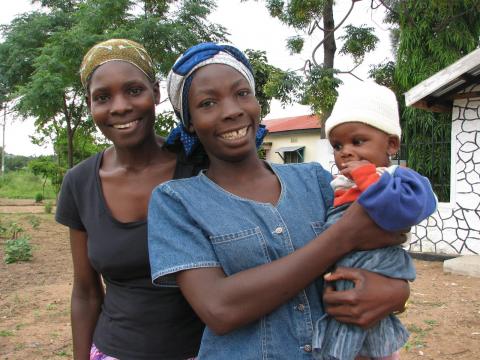
The following article was published in the July-August 2013 NewsNotes.
On May 30, the United Nations High-Level Panel on the Post-2015 Development Agenda presented its final report, A New Global Partnership: Eradicate Poverty and Transform Economies through Sustainable Development. The report proposes a new global partnership that is universal rather than North/South in orientation and targets inequality and poverty wherever it exists. It emphasizes the importance of achieving gender equity as well as the negative role of conflict and violence on sustainable development. The following piece was prepared by Marie Dennis.
In presenting the report, panel members described the need for linkages among the goals, for data driven monitoring and networks of accountability, for a human development index to replace the gross national product statistic as a measure of a nation’s "health," and for economic transformation resulting in inclusive growth.
The report states that "freedom from fear, conflict and violence is the most fundamental human right, and the essential foundation for building peaceful and prosperous societies."
As the High-Level Panel was working on the draft document, civil society organizations – including the Alliance for Peacebuilding, the Global Partnership for the Prevention of Armed Conflict and Saferworld – wrote to the panel:
Supporting change in conflict-affected and fragile states is now the central challenge in international development. Given the need to link conflict prevention and peacebuilding with development in conflict-affected areas – and to prevent violent conflict in all societies – the endorsing organizations jointly urge UN member states, the High-Level Panel, System Task Team on the Post-2015 UN Development Agenda and all other stakeholders involved to include conflict prevention and peacebuilding commitments in the post-2015 development framework.
In welcoming the inclusion of "ensuring stable and peaceful societies" as one of 12 universal goals and national targets proposed by the panel, IKV Pax Christi Netherlands and the Global Partnership for the Prevention of Armed Conflict noted the report’s statement that "conflict must be tackled head-on, even within a universal agenda" and the inclusion of targets to reduce violent deaths and stem external stressors that lead to conflict.
Saferworld also welcomed the report: "This is a monumental step forward for global development thinking, as is the affirmation that such issues are not only pertinent to a subset of ‘crisis’ contexts – but instead constitute a universal agenda, for all countries.
"The breadth of the framing around these issues amounts to an agenda not only for the absence of violence but also for progress on the range of issues related to inclusive, fair, responsive and accountable state-society relations: Freedom from fear, conflict and violence is the most fundamental human right, and the essential foundation for building peaceful and prosperous societies. […] We are calling for a fundamental shift – to recognize peace and good governance as core elements of wellbeing, not optional extras."
The two proposed goals that specifically relate to conflict, violence, rule of law and good governance are
Goal 10: Ensure good governance and effective institutions
10a. Provide free and universal legal identity, such as birth registrations
10b. Ensure people enjoy freedom of speech, association, peaceful protest and access to independent media and information
10c. Increase public participation in political processes and civic engagement at all levels
10d. Guarantee the public’s right to information and access to government data
10e. Reduce bribery and corruption and ensure officials can be held accountable
Goal 11: Ensure peaceful and stable societies
11a. Reduce violent deaths by 100,000 by [year] and eliminate all forms of violence against children
11b. Ensure justice institutions are accessible, independent, well-resourced and respect due-process rights
11c. Stem the external stressors that lead to conflict, including those related to organized crime
11d. Enhance the capacity, professionalism and accountability of the security forces, police and judiciary
In addition, according to Saferworld, there are relevant targets proposed to address: violence against women (under Goal 2); issues of equitable access to services including water, sanitation, healthcare, education, and decent jobs (under a number of other goals); issues of environmental degradation (under Goal 9); and illicit financial flows and tax evasion (under Goal 12).
The report highlights different lists of "external stressors" (see 11c. above) at different points, including "the illicit trade in drugs and arms" and "volatile commodity prices, international corruption, organized crime and the illicit trade in persons, precious minerals and arms."
"Crucially," Saferworld continues, "this is underpinned by a call for indicators of progress to be disaggregated to ensure no one is left behind and targets should only be considered ‘achieved’ if they are met for all relevant income and social groups. In this way … the post-2015 framework can encourage a focus on the horizontal inequalities between social groups that drive and perpetuate violence in many contexts."
A special UN General Assembly meeting to discuss and hopefully to find consensus on a post-2015 development agenda will take place in September 2013.
